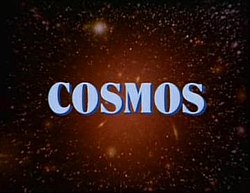Cosmos (TV series)
| Cosmos: A Personal Voyage | |
|---|---|
 |
|
| Genre | Documentary |
| Created by |
Carl Sagan Ann Druyan Steven Soter |
| Directed by | Adrian Malone |
| Presented by | Carl Sagan |
| Composer(s) | Vangelis; various artists |
| Country of origin | United States |
| Original language(s) | English |
| No. of seasons | 1 |
| No. of episodes | 13 (list of episodes) |
| Production | |
| Producer(s) | Gregory Andorfer Rob McCain |
| Running time | 60 minutes |
| Release | |
| Original network | PBS |
| Picture format | 4:3 SDTV |
| Audio format | Stereo |
| Original release | September 28 – December 21, 1980 |
| Chronology | |
| Followed by | Cosmos: A Spacetime Odyssey |
| External links | |
| Website | |
Cosmos: A Personal Voyage is a thirteen-part television series written by Carl Sagan, Ann Druyan, and Steven Soter, with Sagan as presenter. It was executive-produced by Adrian Malone, produced by David Kennard, Geoffrey Haines-Stiles, and Gregory Andorfer, and directed by the producers, David Oyster, Richard Wells, Tom Weidlinger, and others. It covers a wide range of scientific subjects, including the origin of life and a perspective of our place in the universe.
The series was first broadcast by the Public Broadcasting Service in 1980, and was the most widely watched series in the history of American public television until The Civil War (1990). As of 2009, it was still the most widely watched PBS series in the world. It won two Emmys and a Peabody Award, and has since been broadcast in more than 60 countries and seen by over 500 million people. A book was also published to accompany the series.
Cosmos: A Personal Voyage has been considered highly significant since its broadcast; David Itzkoff of The New York Times described it as "a watershed moment for science-themed television programming".
Cosmos was produced in 1978 and 1979 by former Los Angeles PBS affiliate KCET on a roughly $6.3 million budget, with over $2 million additionally allocated to promotion. The program's format is similar to earlier BBC documentaries such as Kenneth Clark's Civilisation, Jacob Bronowski's The Ascent of Man, and David Attenborough's Life on Earth. However, unlike those series, which were shot entirely on film, Cosmos used videotape for interior scenes and special effects, with film being used for exteriors. The BBC—a co-producer of Cosmos—later screened the series, but the episodes were cut to fit 50-minute slots.
...
Wikipedia
